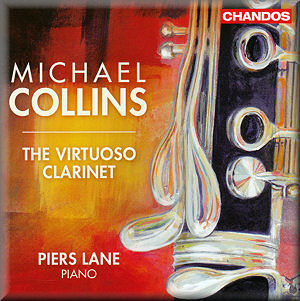 |
 |
|


alternatively
CD: MDT
AmazonUK
AmazonUS
Sound
Samples & Downloads |
The Virtuoso Clarinet
Alamiro GIAMPIERI (1893-1963)
Il carnevale di Venezia, capriccio variato for clarinet and piano
(1948) [6:53]
André MESSAGER (1853-1929)
Solo de concours for clarinet and piano (1899) [5:31]
Darius MILHAUD (1892-1974)
Scaramouche, Op.165b (arr. Milhaud) (1937) [9:41]
Donato LOVREGLIO (1841-1907)
Fantasia da concerto su motivi de La Traviata di G.Verdi,
Op.54 (revised by A.Giampieri) (1865) [10:08]
George GERSHWIN (1898-1937)
Three Preludes (arr. for clarinet and piano by James Cohn) (1926)
[7:13]
Sergei RACHMANINOFF (1873-1943)
Vocalise, Op.34 No.14 (arr. for clarinet and piano by David Campbell)
(1912) [5:54]
Carl Maria von WEBER (1786-1826)
Grand Duo concertant for clarinet and piano, Op.48, J 204 (1815-16)
[19:25]
Simon MILTON (b.1977)
Carmen Fantasy for clarinet and piano, Op.22 (2009) [9:01]
 Michael Collins (clarinet), Piers Lane (piano)
Michael Collins (clarinet), Piers Lane (piano)
rec. Jan. 2009, Sofienberg Church.
 CHANDOS CHAN10615 [73:52]
CHANDOS CHAN10615 [73:52] 
|
|
|
One of the great clarinet players of our times, Michael Collins,
has apparently embarked on a series of discs that will emphasize
different aspects of the instrument. The present disc is for
the most part devoted to the showy, virtuosic side of clarinet
– hence the title. Collins’ clarinet voice is sharp, sometimes
close to shrill, very clear and articulated. So, if you prefer
your clarinet soft and pliant, you may have troubles listening
to the entire disc in one go. This British musician, as usual,
excels in shaping the phrases; they emerge aurally embossed
as it were. His staccato is light, and his legato is very smooth.
Piers Lane is a perfect partner. He is eloquent and does not
stand in the shade of the clarinet – this is especially noticeable
in Weber’s Grand Duo concertant, which is a real duo
of equals.
The Italian fantasias of Giampieri and Lovreglio are multi-colored
and bright. Collins highlights the soft humor of the Carnevale
di Venezia variations and dispatches the virtuosic passages
effortlessly. Lovreglio’s fantasia on La Traviata is
fully operatic – although its spirit is closer to Donizetti
than to Verdi. Anyone who adores this opera will enjoy such
loving and inventive handling of its gorgeous melodies.
The Solo de concours of André Messager is a test-piece.
Besides testing the technical prowess of the player, it is also
a musical statement, its style somewhere between Rimsky-Korsakov
and Saint-Saëns, with warm French lyricism surrounded by passages
of elegant bravura. The piece may not leave profound memories,
but it’s enjoyable. The sweet-and-sour taste of polytonality
is felt in Milhaud’s Scaramouche. It sounds a bit like
a patchwork - and actually is one, as the liner-note tells us.
Still, there is a lot of beauty. This is one of Milhaud’s most
easily accessible works. The final part, Brazileira,
is enormous fun.
The transcriptions of Gershwin’s Preludes and Rachmaninov’s
Vocalise are very well written, and I wonder why they
are not better represented on disc. The Gershwin is especially
alive and characteristic. It captures well the very essence
of the composer, and is performed with style. In Vocalise
the performers go too fast, and lose its emotional freight.
The notes are there, but that haunting melancholy is gone. Another
miss is Simon Milton’s Carmen Fantasy. Well, we all know
that Carmen was a famous Chinese rhythmic gymnast, who amazed
her admirers by her perfect technique and extremely fast manipulation
of various apparatus such as ropes, ribbons, etc. What, no?
Well, that’s how she is shown here. Instead of charm and sensuality
we get elaborations that are brilliant yet somewhat mechanical.
The Habanera section sounds like a soundtrack to a silent
movie.
The largest composition on the disc is Weber’s Grand Duo
concertant. The performance by Collins and Lane is full
of energy. The first movement has an excellent momentum. Sometimes
I had the feeling that the pressure was too constant, and that
the music would benefit from a more relaxed approach. Still,
the enthusiasm is engaging, and Collins’ phrasing is unbeatable.
The slow movement is played very much con moto. It is
agitated from the very start, and is overall more dramatic than
lyrical. The finale is lilting and playful. This is a very extrovert
reading.
The liner-note by Calum MacDonald is in English, German and
French, and is really extensive. Much space is devoted to each
piece, and I am sure you’ll find new information even if you
know this music inside out. The quality of the recording is
excellent: it is very clear and resonant, and the balance between
the two instruments is perfect. All in all, this album delivers
what its title promises: this is the virtuoso clarinet.
Sometimes I feel that the virtuosity eclipses other aspects
of the music, but for the most part this is an exciting ride.
Oleg Ledeniov
|
|












